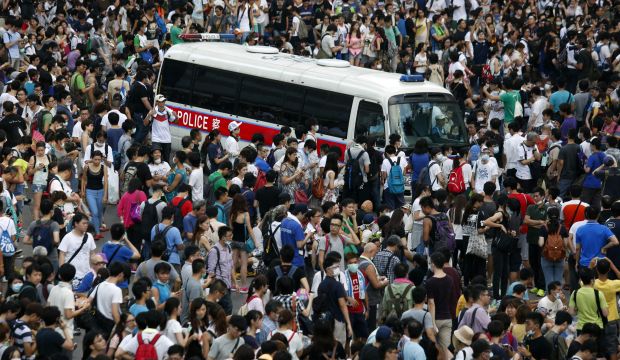
A police vehicle stands still as tens of thousands of protesters block the main street to the financial Central district outside the government headquarters in Hong Kong September 28, 2014. (REUTERS/Bobby Yip)
Chanting “remove the blockade,” thousands of protesters blocked one of the busiest streets, Gloucester Road, and milled among the stalled traffic after Hong Kong leader Leung Chun-ying pledged “resolute” action against a movement known as Occupy Central with Love and Peace.
Inside the cordon, thousands huddled in plastic capes, masks and goggles, a defense against any further use of pepper spray, as they waited for a fresh police charge to clear the area before Hong Kong, a global financial center, opens for business on Monday morning.
Hundreds of police, donning helmets, cordoned off streets and walkways in Admiralty district, next to the Central business district, after tension flared amid the arrests of several lawmakers and the seizure of audio equipment.
Police commissioner Andy Tsang Wai-hung declined to say when police would move to clear the area.
“We only use force when it is necessary,” he said.
While police were urging demonstrators to leave the zone, officers were threatening to arrest anyone trying to force their way in.
Hong Kong returned to Chinese rule in 1997 under a formula known as “one country, two systems” that guaranteed a high degree of autonomy and freedoms not enjoyed in mainland China. Universal suffrage was set as an eventual goal.
But Beijing last month rejected demands for people to freely choose the city’s next leader, prompting threats from activists to shut down Central. China wants to limit elections to a handful of candidates loyal to Beijing.
While promising a fresh round of public consultation, Leung also described Beijing’s decision as “legally binding.”
Publishing tycoon Jimmy Lai, a key backer of the democratic movement, said he wanted as big a crowd of protesters as possible, after a week of student demonstrations, to thwart any crackdown.
“The more Hong Kong citizens come, the more unlikely the police can clear up the place,” said Lai, also wearing a plastic cape and workmen’s protective glasses. “I believe more Hong Kong citizens will show up later on Sunday.”
Some have trained for months in non-violent resistance, determined to make it as hard as possible for police to move them—their actions mirrored by police who have also stepped up anti-riot training and other tactics.
“I stay because I want to support the students,” said one protester, surnamed Mak, as she huddled under a raincoat waiting for the police to charge. “It is worth to do it.”
Jacky Wong, a 55-year-old former high school teacher, said he was protesting to support the students. “In my day, we had everything, house, car, wife, children…this generation has nothing.”
Communist Party leaders in Beijing are terrified of calls for democracy spreading to cities on the mainland, threatening their grip on power. Dissent as seen in Hong Kong would never be allowed on the mainland, where student protests calling for democracy were crushed with heavy loss of life on and around Beijing’s Tiananmen Square on June 4, 1989.
Pro-democracy Hong Kong lawmaker Lee Cheuk-yan said three fellow legislators were among a small group of activists detained by police, including democratic leaders Albert Ho and Emily Lau.
Some family groups were among the crowd, while one man in his 90s said he been fighting for democracy since the 1960s.
Veteran democracy campaigner Martin Lee said Hong Kong people believed democracy was good for the city and the rest of China.
“They are prepared to sacrifice the comfort of freedom for the sake of themselves, their children and their children’s children,” he said.
Organizers said as many as 80,000 people thronged the streets in Admiralty, galvanized by the arrests of student activists on Friday.
No independent estimate of the crowd numbers was available but the action is being seen as the most tenacious civil disobedience action since 1997.
A week of protests escalated into violence when student-led demonstrators broke through a cordon late on Friday and scaled a fence to invade the city’s main government compound after a week of peaceful action. Police used pepper spray to disperse the crowd.
The clashes were the most heated in a series of anti-Beijing protests that underscore the central government’s challenge to stamp its will on Hong Kong.
Police have so far arrested 78 people, including Joshua Wong, the 17-year-old leader of student group Scholarism, who was dragged away after he called on the protesters to charge the government premises. He was still in detention on Sunday.
His parents said in a statement the decision to detain him was an act of “political persecution.”
As the crowd built in support of the students, the leaders of Occupy announced they had brought forward their own campaign, which had been due to start mid-week targeting the Central financial district.
Along with Hong Kong and Chinese officials, some of Hong Kong’s most powerful tycoons and pro-establishment figures have spoken out against the Occupy movement, warning it could threaten the city’s business and economic stability.
Former Justice Secretary Elsie Leung warned against any extreme actions in attempting to force Beijing to give Hong Kong concessions, saying it would have the opposite effect, RTHK radio reported.
